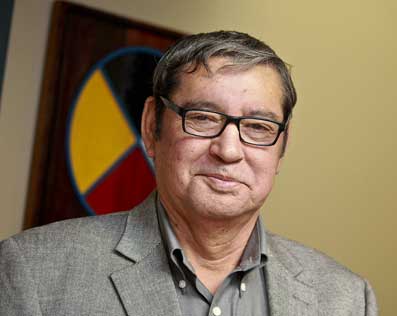Of everything that sets the University of Lethbridge apart from other post-secondary institutions, its deeply-rooted relationship with First Nations, Métis and Inuit (FNMI) peoples, and specifically the Blackfoot nation, is intrinsically unique.
The University can justifiably take pride in being among the first universities in Canada to include a major in Native American Studies among its liberal education components. It can also take pride in the extensive range of innovative academic programs, research and creative activity related to FNMI peoples developed across Faculties, coupled with active student services support programs.
And yet there are gaps in those supports and incongruences across campus in the delivery of academic programming related to Aboriginal Peoples.

In September 2011, President Mike Mahon asked professor Dr. Leroy Little Bear (BASc (BA) ’72, DASc ’04), Roy Weasel Fat (Red Crow Community College vice-president academic) and professor Dr. Jane O'Dea to develop an overarching strategy that would create support for FNMI students, faculty, staff and community members at the University of Lethbridge.
The FNMI Report to the President (available at www.uleth.ca/president/fnmi) was the result, and the development of an FNMI Centre, of which Weasel Fat is now the interim director, is a key recommendation of the report.
"Like all Native centres in Alberta, it's basically focused around student support – what can the centre provide in terms of supporting students so that we can improve their retention and completion rates," says Weasel Fat.
A master's degree holder in education and major player in establishing the current relationship between the University and Red Crow College (he served 17 years there, most recently as the vice-president academic), Weasel Fat speaks to the importance of education in bettering the Aboriginal community.
"Education is the most recognized path to reach self determination," he says.
"There are many people from my generation who are going back to school and their kids will follow and also become educated. Once the parents become educated, then it's an expectation for their children, and that helps bring our people out of that cycle of poverty."
He understands better than most that this cannot be accomplished without the proper support systems for Aboriginal students and the FNMI report identifies seven major recommendations to help achieve that goal.
From the creation of a Niitsitapi Gathering Place to the establishment of an Elders Program and Aboriginal Education Policy, the report is closely aligned with the University's 2009-2013 Strategic Plan.
One aspect especially important to Weasel Fat is the involvement of band elders.
"When we looked at other centres across B.C. and Alberta, what I noticed was that there was very minimal elder involvement," says Weasel Fat. "This is something our students have asked for and one of the mandates of the FNMI Centre, to increase the elders' presence here so that they can be available to the U of L community."
He describes the role elders play in traditional Blackfoot communities as integral.
"Their role in the community is to act as traditional mentors, to provide spiritual support and to keep our history and culture alive," he says.
Weasel Fat sees the Niitsitapi Gathering Place as a community room that would benefit the entire University.
"There is a lot of Aboriginal activity across campus through programs in virtually every Faculty but a centre like this can provide a venue for dissemination and collaboration of research for those who are working in these areas across the University," he says.
Weasel Fat speaks quietly, but with an eagerness that is genuine in its belief. He is a product of what an education can achieve, and he has passed those lessons on to his family through his example. He recently had two sons graduate from the U of L (Roy Jr. BA '12 and Cy BA '11) and quickly move into managerial roles on the Blood Reserve, while his daughter Triscia is a fourth-year student and looking to enter the Faculty of Education next fall.
"When I first started out in education, my first instinct was to go back home and help my people," he says. "Education has been of benefit to my own family as well as my community and I will continue to promote education to our community plus share the Blackfoot culture with the U of L."
This story first appeared in the October 2012 issue of the Legend. To see the full issue in a flipbook format, follow this link.
